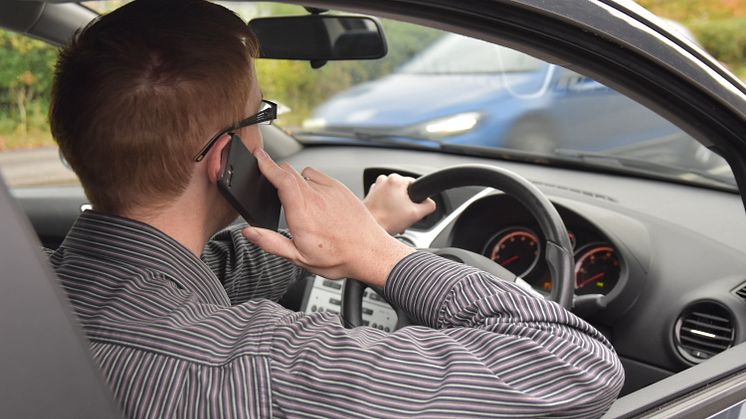
Press release -
A fifth of firms say drivers in accidents due to using handheld phones at the wheel
One in five (19%) UK firms say their employees have been involved in an accident while driving for work due to using a handheld phone at the wheel, according to new research*.
RAC Business has revealed the findings from its survey of 1,000 UK businesses, carried out across all fleet sizes and sectors, to highlight current attitudes to handheld mobile phone use and driving for work.
A year after increased penalties were introduced for using handheld phones at the wheel on March 1, 2017, the research found 15% of businesses admit their drivers are ‘often involved’ in accidents while using a handheld phone. And 5% even said it happened ‘on a regular basis’.
RAC Business said one of the contributing factors could be that four in 10 (38%) businesses said they expect commercial drivers to answer calls while on the road. For larger businesses (500 to 1000 employees) that figure rises to 49%.
However, almost a third (30%) of businesses of all sizes don’t provide legally compliant hands-free kits and 20% have no policy for mobile phone use while driving.
The results of the survey have prompted calls from RAC Business for fleets and business owners to highlight the dangers of using a handheld phone at the wheel to their employees and to make sure they have a policy in place for the use of phones while driving for work.
Rod Dennis, from the RAC’s Be Phone Smart campaign, which was launched to encourage motorists to pledge not to use their handheld phone or smart device at the wheel, said the law is clear on the issue.
He said: “It is illegal to use a handheld phone while driving. But at the same time we recognise that businesses need to stay in touch with drivers and commercial vehicle drivers need to stay in touch with customers.
“The use of hands-free kits is within the law and that can provide a legal and safer solution for businesses, which is how many different businesses operate.
“If employers expect their company drivers and staff to take calls on the road, which 38% admit they do according to our research, then they should be providing legally compliant hands-free kits so they can do that without breaking the law.
“Our survey says 70% of employers do provide hands-free kits, but in our view that still needs to be much higher, and every business should have a clear code of conduct or policy for drivers.
“However just because it’s legal to use a hands-free kit, it doesn’t necessarily means it’s always safe to do so, and it certainly shouldn’t be used to have long conference calls or to proactively make lots of calls on a long journey.
“It should always be down to the driver in terms of how they feel about taking a call and they should only do so if they judge it to be safe and not causing them a distraction.
“In the same survey we asked businesses whether it was important to uphold their ‘duty of care’ towards their company drivers and 92% agreed it was.
“Therefore businesses need to have a policy in place which is not only clear in the expectations of their drivers, but also needs to have a high profile in the business to ensure the message is getting through.”
ENDS
Topics
Categories
Notes to editors
*Research commissioned by RAC Business and conducted by 3Gem Media during September/October 2017, across a sample of 1,000 UK businesses.
About the RAC
First formed in 1897 the RAC has been looking after the needs of its members and championing the interests of motorists for more than 120 years.
Today it has more than eight million members and is one of the UK’s most progressive motoring organisations, providing services for both private and business motorists. Whether it's roadside assistance, insurance, buying a used car, vehicle inspections and checks, legal services or up-to-the-minute traffic and travel information – the RAC offers a solution for all motoring needs. The RAC is committed to making motoring easier, safer, more affordable and more enjoyable for drivers and road users.
The RAC is the motorist’s champion and campaigns to support the interests of its members and UK motorists at a national level. This includes voicing concerns about the increasing cost of motoring, particularly the price of fuel and the high level of tax levied on it, advancing levels of road safety, and supporting the needs of all drivers, from young to old.
The RAC’s annual Report on Motoring – first published in 1989 – provides a clear insight into the concerns and issues facing today’s motorists.
For the very latest news on UK fuel prices, check RAC Fuel Watch or follow #racfuelwatch on Twitter. RAC Fuel Watch is a comprehensive guide to the latest UK unleaded petrol and diesel prices – both at the wholesale level and at the pump. RAC Fuel Watch analyses how prices changed through the previous month and compares the most recent prices with those from three, six and 12 months before.
Key facts:
- RAC patrols fix four out of five vehicles at the roadside and on average within 30 minutes
- RAC vans carry more than 500 parts and tools to get members’ vehicles going again
- 92% of members would recommend RAC Rescue to their friends and family

